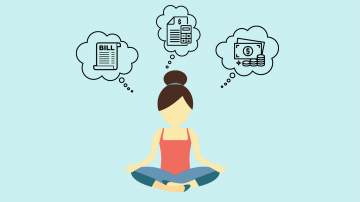It’s not all about money! If you aren’t healthy, mentally your money habits are surely impacted.
Let’s face it, money and emotions cohabitate in our psyche. Whether we would like to admit it or not, our relationship with money is often tied to our mental health.
It’s a two-way street—our mental health impacts the way we manage money, and the way we handle money affects our mental health. Finance and feelings seem like two very different worlds, but they overlap more than we might realize.
So how can we bolster our mental health in a tangible way? BUDGETING!
Creating and sticking to a budget puts you in control of your money. Having control of your money can give you more focus, lower stress levels, and take away guilt and shame around your financial decisions.
The Relationship Between Money and Mental Health
It’s probably a safe bet to say that most believe that their problem with money is that they do not have enough of it. But our experience with clients here at Worthwhile Wealth Council tells a different story.
We find that financial behavior often gets its roots from how money was handled in our childhood family homes. Maybe it’s due to a fear of, or experience with, not having quite enough. Perhaps it’s a symptom of some other issue—a desire to feel like you belong, or a brief (and sometimes expensive) escape from a reality you don’t want to acknowledge. Perhaps you’re chronically disorganized or overly controlling. Maybe you just really like buying stuff and get yourself into sticky financial situations as a result.
Do some serious thinking about what problems you’re having with money and why those issues may have started and find a way to make amends. Forgive your past transgression with money, break the chain of generational money woes, and start a new financial journey with the simple act of making a budget.
Remember to consider your personal weaknesses with budgeting upfront and seek out ways to thwart the part of you that’s going to be tempted to fall back into old habits.
The Mental Health Benefits of Budgeting
Your brain and body will thank you for taking the step toward a healthier financial future. Here are a few things that budgeting will help you let go of: Shame, Helplessness, feeling overwhelmed, anxiety and dread about checking your accounts, and guilt when you treat yourself.
Whether your feelings are a consequence of spending or your spending is a byproduct of your feelings, a budget is a big first step to finding some peace. Will it make you independently wealthy overnight? Probably not. But it’s an actionable, tangible step that will bring you more focus and clarity, give you some control over your spending, and will encourage you to be more realistic about your money and your lifestyle.
Also, a budget helps you feel good when you do treat yourself—when you’ve set aside money for a purchase, you earned that treat. There’s no guilt or shame or anxiety about whether you can afford it; you know you can because you know what the rest of your money is doing.
The Big Picture
Of course, budgeting is just one part of a complicated equation when it comes to mental health issues. Getting organized, creating a system of accountability, visualizing your progress, and being realistic about your money has a wide-reaching ripple effect on other areas of life and is an easy first step to take with the help of an established system.
Here a Worthwhile we have a team of advisors who are here to help! Contact us anytime 423-610-0099!
This commentary was originally posted by Ashley McCann | on July 21, 2021. Sourced from: Money and Mental Health: Budgeting as Self-Care | You Need A Budget
**Disclaimer: This material has been prepared for informational purposes only, and is not intended to provide, and should not be relied on for, tax, legal or accounting advice. You should consult your own tax, legal and accounting advisors before engaging in any transaction.


